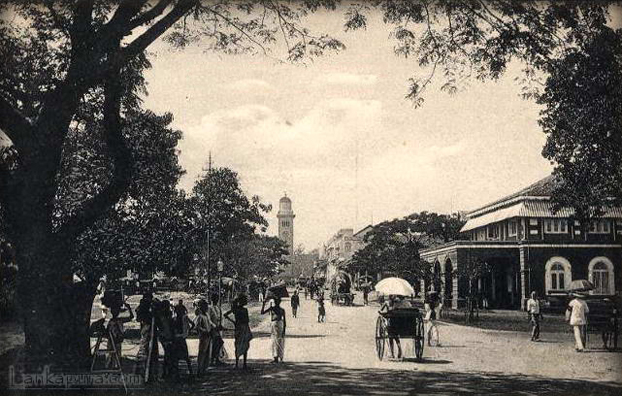|
Musings
The ‘happy’ days: Of the young colony of Ceylon
by Padma Edirisinghe
|

Street scene, Fort, Colombo.
Pic. courtesy: Delcampe.net |
They were happy days but as usual only for those at the top. The
‘Middle’ enjoyed middling days and the poor, trying days. The most
fortunately placed were the British Governors and their coteries.The
Governor had a palace right in the middle of the city and kings’
pavilions in the main sub cities and also country houses. When night
came on there were clubs in plenty and even the conference halls turned
to clubs when the day’s work was over. A clever network of roads run by
Edward Barnes made travelling sleek all over the island and horses began
to run in Nuwara Eliya after the very same person saw to it that it was
a mini-European city.
The 1833 Colebrooke Commission had seen to the welfare of education,
mostly of higher education where the students were offspring of affluent
families who ended up by being carbon copies of the masters. The very
lucky of them entered Universities in England. Random repairs to the
Parish system of education threw a sop to the poor. But a proposal that
all should be given an education in English, was not carried out due to
lack of staff. This led to a wide gap in education that is still
running.
One rebellion however had cropped up and had been suppressed giving
the country its first lot of national heroes fighting against foreign
invaders from the West. Now almost everything seemed to be settled but
some very important facets were lacking as internal communication.
Communication-wise the country was in very poor conditions. But Governor
Horton who was entrusted with the task of carrying our Colebrooke
reforms came here with many dreams and illusions. In a letter that he
received before coming here, the island is described as, ‘one of the
happiest and loveliest spots in the universe’.
Horton said to be a man of cultivated tastes now, once come over
decided to fill some noteworthy gaps. That was a newspaper. We would
come to that later and stop at his wife, lady Horton said to be a
beauty.
It was of her, that Byron had written the lines,
“She walks in beauty, like the night
Of cloudless climes and starry skies,
And all that is best of dark and light
Meet in her aspect and her eyes”
Though all the governors had not been accompanied by their wives with
a good number of bachelors too, Horton’s wife had come and walked in
beauty here for five years. “However, she is mentioned in major news
only when she left the island in the Tigris”.
In the meantime Horton performed many a happy task as pioneering the
newspaper world of Lanka or Ceylon. Wasn’t there no news disseminators
till then? Why not. The Govt. Gazette was there, a poor specimen that
doled out extracts from Indian journals for want of news. Then Horton
remembered today by Horton Place, began the Colombo Journal, printed by
George Lee. The Governor himself contributed much signing by a pen name,
Timon or Liber.
The merchants of Colombo now began ‘The Observer & Commercial
advertiser’ that began attacking the Governor. ‘The Ceylon chronicle’
then appeared to counter attack it. Indeed they were happy and exciting
days, but only for the very rich and the very literate, Horton himself
an epitome of it all. To add to the happiness the pearl fisheries gave
the highest profits ,105, 791 pounds.
The Calcutta Englishman 1837 carries this eulogy to Colombo society.
“ … Much more approaching to the English in style than that of
Calcutta. … possessing much hospitality”
Really a very good imitator.
The Governor and his wife further earn mention and praise for bonding
with conciliatory measures, the different segments of a small society.
Those were really happy days though sparks were tuning a light russet
in the backwoods for a flare up of the 1848 rebellion that occurred in
the subsequent regimes. Horton could not foresee all that for he was a
very optimistic poet. Very literary minded the sent invitations for
meetings and even rejections via verses.
Here is a sample.
‘My dear Charles, I much lament
Considering your kind intent, That deep reflection bids me say
With much regret, alas and nay
You quite forget I have the chair
The poor are my special Care.’
That is rejecting an invitation in by the Chief Justice, Sir Charles
Marshall.
He is said to be absent minded too as in the scuffle with the
Merchants. He wrote to the Undersecretary questioning, “Who the deuce
they think they are ?”
And posted it to the merchants themselves!
The Sinhala newspapers made their debut a few decades after and it
carried snippets to show that the poor, that Wilmot did not forget still
eked out their miserable lives .
Yet on the surface they were GOOD TIMES where ‘The lady walked in
beauty’. |

